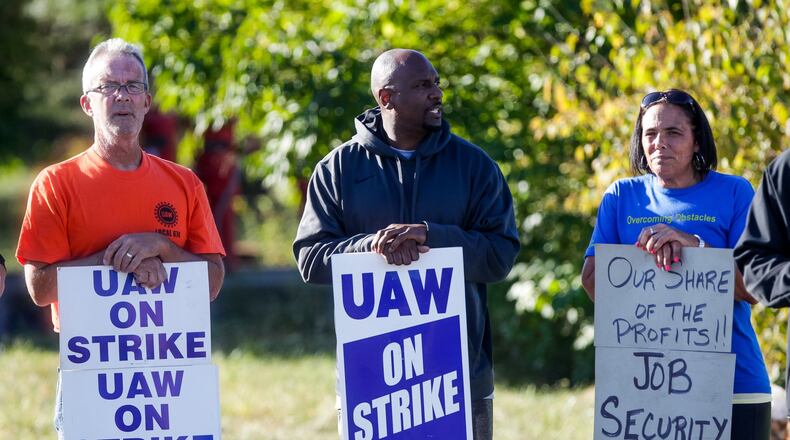“Bad enough that anything very serious that is not driveable is probably not going to get fixed until after the strike is resolved,” said Tim Trimbach, owner of Trimbach’s body shop in Tipp City.
Trimbach said he is forced to tell some prospective customers that their GM vehicles simply can’t be fixed until he and others can obtain parts again.
» BIZ BEAT: Fuyao workers’ class action suit is settled
“Minor jobs we can usually limp by on and get people driveable and keep them to where they’re safe to drive on the road until we can get the remainder of the parts in at a later date,” he said. “The non-driveables are the ones that are a problem.”
On Sept. 15, about 46,000 UAW members went on strike against GM nationwide. Talks have continued, but any evident progress has been slow.
So far, the strike has cost GM at least $1.13 billion in profits, according to a new report by Anderson Economic Group, based in East Lansing, Mich.
“It’s a very significant impact,” said Brian Peterson, director of public policy and economic analysis for Anderson.
FAST READS
• New owner buys area bank site for $1M
• How are Dayton-area companies finding workers? By training them
• Dayton mayor to statewide audience: City faces crisis of gunviolence
Peterson said Monday that workers for both GM and suppliers have also lost wages. In total, Anderson estimates GM and supplier workers have lost $624 million in wages nationwide.
“I think that’s a major concern, and a large consideration in these negotiations,” Peterson said.
It’s more than a simple lack of production of parts, Trimbach said. Even auto parts warehouses are running out of components and are unable to obtain new parts.
“The dealers, their parts departments, they’re scrambling, trying to fill orders the best they can,” Trimbach said. “If we have a crisis part that we’re in dire need of, they’re trying to run them on what we call ‘locators’ around the country, to see if we can have them shipped in.”
Several Dayton-area dealers declined to comment for this story. One dealer explained that acknowledging a shortage of crucial parts could impact customer foot traffic.
Scott Hennigan, who co-owns Maine’s Collision Repair & Body Shop, said parts for GM associated vehicles have become hard to find. He said most area dealerships that are affiliated with GM, that provide parts to his shop, are running out of inventory.
The shortage in parts have caused businesses like Hennigan’s unable to repair cars that require GM parts. Though he is able to take on other clients in the meantime, he estimated that half the cars that come to his shop in a given week are GM brands.
“We have had insurance companies that had to total out due to a lack of parts,” Hennigan said. “Most customers are waiting for parts to become available.”
The strike has had wide ripple effects. Moraine truck engine producer DMAX — which makes diesel engines for GM heavy-duty trucks — has about 550 workers on temporary layoff due to the strike, which has halted production at more than 50 GM plants in 10 states. Navistar in Springfield has been affected, as well.
FAST READS
• Local Gordman’s stores looking for seasonal workers
• JCPenney needs workers to meet holiday demand
Dealers and those who rely on an inventory of GM parts have been down this road before. After a 1998 strike by two metal stamping plants in Flint, Mich., GM lost more than $3 billion.
“That was the last major GM strike,” Peterson said.
That 1998 strike inspired GM to adjust its supply chain so that it was less reliant on UAW-represented parts plants. The automaker spun off its parts-making arm, Delphi, to corporate independence in 1999, and in 2005, Delphi collapsed into a painful four-year bankruptcy saga.
Today, GM is a more global company that relies on a more independent and varied network of parts suppliers.
But any strike that involves nearly 50,000 workers, as this one does, is bound to have a strong impact on parts availability.
Leaders of GM likely suspected this strike was a possibility, and the company tried to build a “healthy” inventory of vehicles in preparation, Peterson said.
“But, you know, after five weeks, there are obviously declining inventories,” he added.
Any tentative agreement reached in bargaining will have to be presented to UAW members for a vote. The soonest Peterson sees the strike ending would be Oct. 21, he said Monday.
By the numbers
46K: UAW members on strike
$1.13B: GM profits loss since strike
$624M: Lost wages by GM workers
About the Author

